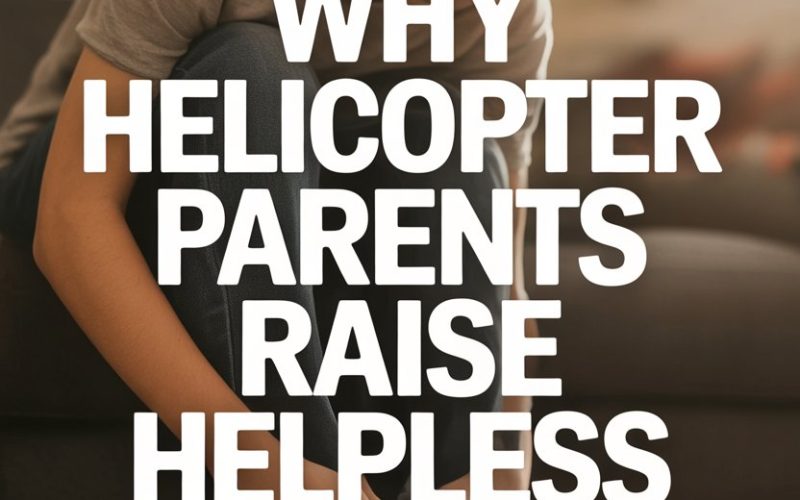It’s a well-meaning parent’s worst nightmare: your bright-eyed little darling grows up, enters secondary school, and, by sixteen, can quote ancient Greek philosophers but can’t microwave their own dinner without a WhatsApp video tutorial.
If you’ve ever found yourself triple-checking your teen’s homework diary for them, you’re not alone.
But there’s a fine line between “supportive” and “suffocating,” and it’s easier to cross than finding a sock without a hole on laundry day.
What Exactly Is Helicopter Parenting Anyway?
Picture a parent hovering over every aspect of a child’s life—ready to swoop in at the first sign of trouble, shielding from life’s bumps and bruises. That’s the classic helicopter scenario.
It sounds loving (and let’s be honest, a little exhausting). The urge to fix, advise, and smooth out the path is natural.
After all, nobody wants their child to get hurt, fail a test, or end up on a viral “Epic Fails” video.
But research—including this study from the University of Arizona—shows that when parents over-manage, teens often end up less resilient, more anxious, and (ironically) less prepared for adulthood.
The Confidence Thief: How Hovering Undermines Self-Efficacy
Every time a parent steps in to “rescue,” it quietly steals a child’s opportunity to problem-solve. Psychologist Dr. Madeline Levine, author of Teach Your Children Well, calls this the “confidence thief” effect.
When kids aren’t allowed to try, fail, and recover, they stop trusting their own abilities.
You might think you’re helping when you call the teacher about a forgotten project. But your teen learns, “If I mess up, Mum or Dad will sort it.”
The result? A 15-year-old who can recite quadratic equations but can’t read a bus timetable.
Anxiety: The Unwanted Side Effect
Shielding kids from struggle doesn’t make life easier—it often does the opposite.
Recent data from the Pew Research Center shows anxiety among teens is higher than ever, and psychologists believe excessive parental involvement is partly to blame.
When everything is orchestrated behind the scenes, life feels unpredictable and scary the moment the training wheels come off.
Teens who haven’t learned to cope with stress can spiral when faced with ordinary setbacks, like a poor test score or a friendship glitch.
Delayed Life Skills: Because Mum Was Always There
There’s a generation of teens who can code, speak Mandarin, and negotiate Minecraft treaties—yet can’t toast a crumpet or book a GP appointment. Why? Because someone has always done it for them.
A growing body of research warns that over-parenting delays basic life skills.
A 2019 survey by The New York Times found that many university students arrive on campus never having managed their own schedule, laundry, or banking. (No, transferring money from the “Bank of Mum and Dad” doesn’t count.)
Why It Happens: Good Intentions Gone Wild
Let’s be honest: helicoptering starts with the best of intentions.
You want to prevent pain, disappointment, and anxiety. You want to set your child up for success—with a side of top grades and a nice, shiny CV for uni applications.
And yes, the pressure is real. Between school league tables, TikTok compare-and-despair, and Karen from Pilates whose son just got into Oxbridge, it’s tempting to intervene at every turn.
But today’s over-involved parenting style often sends teens the message: “You can’t do this without me.” Not quite what anyone intended.
The Fallout: Teens Who Can’t Launch
Universities are now running “adulting” workshops and basic life skills classes for incoming students—think laundry, self-care, and time management. Let that sink in.
When teens haven’t been allowed to struggle, figure things out, or (gasp) fail, it’s no wonder they freeze at ordinary adult tasks.
Employers report that new grads are less independent and less likely to persevere through workplace challenges compared to those who’ve learned grit at home.
Nobody wants to be the parent whose 19-year-old rings home from uni to ask which setting to use on the washing machine. Again.
Spot the Signs: Is This You?
Wondering if you’ve drifted into helicopter territory? Here are a few classic signs:
- You proofread every essay, even when you’re not asked.
- You email teachers about test results before your child does.
- You set reminders for your teen’s deadlines (and send them regular “gentle” nudges).
- You intervene in friendship disputes, sometimes before your teen even knows there is one.
If any of these sound familiar—don’t panic. It’s never too late to switch to autopilot (well, partial autopilot).
How to Step Back Without Letting Go Entirely
Easier said than done, right? Here’s how to start tonight—without feeling like you’ve left your child to fend for themselves on a desert island.
Start with Small Risks
Encourage your teen to tackle bite-sized challenges. Maybe it’s calling to book a haircut, making a simple dinner, or sorting their own school bag. Little victories build confidence.
Let Them Fail—Supportively
Nobody enjoys watching their child struggle, but it’s the fastest route to resilience. When things go pear-shaped, offer empathy (“Ugh, that stinks!”), then brainstorm solutions together rather than leaping to fix it.
Ask Before Advising
Try the magic phrase: “Would you like advice or just a listening ear?” This tiny tweak teaches your teen to own their problems and signals that you trust their judgment.
Hold Back on the Rescue Mission
The next time you get a panicked text about a forgotten PE kit, pause before jumping in the car. Most teens are far more resourceful than we think—if given the chance.
Model Adulting
Let your child see you muddle through your own stuff-ups, whether it’s burning dinner or sending an email to the wrong person. Resilience is contagious.
Set Boundaries for Yourself
If you struggle with stepping back, set your own ground rules. Maybe you’ll only check the school portal once a week, or wait to be asked before editing an essay.
Accountability works both ways.
Celebrate Effort, Not Perfection
When your teen tries something tough—or even fails spectacularly—offer praise for the attempt, not just the outcome. Risk-taking and persistence are the real skills you want to nurture.
Why It’s Worth the Discomfort
Change feels uncomfortable, especially if you’ve been firmly in the pilot’s seat for years.
But the payoff? Raising a teen who can muddle through, get themselves out of a sticky spot, and ring you with good news instead of every minor disaster.
Trusting your child to sweat the small stuff doesn’t mean you care less. It’s the opposite. You’re giving them the gift of independence—and, eventually, a bit more peace for yourself.
The Long Game: Raising a Capable Adult
Helicopter parenting often springs from a place of love and fear.
But fast-forward a few years, and the same teens who had every problem solved for them can feel lost, anxious, and ill-equipped for life outside the family bubble.
Much as you might want to swoop in, there’s real freedom (for both of you) in stepping back. Yes, your teen will make mistakes. So did you.
And look at you now, reading articles about parenting instead of leaving your dinner in the microwave until it’s nuclear hot.
Teens need the chance to practice, fail, recover, and ultimately trust themselves.
The more you allow them to try, the less likely you’ll be asked for step-by-step toast instructions when they’re 22.
So tonight, hand over the spatula, the bus pass, or even the phone. Then stand back.
You might be surprised how far they’ll fly—without anyone circling overhead.





